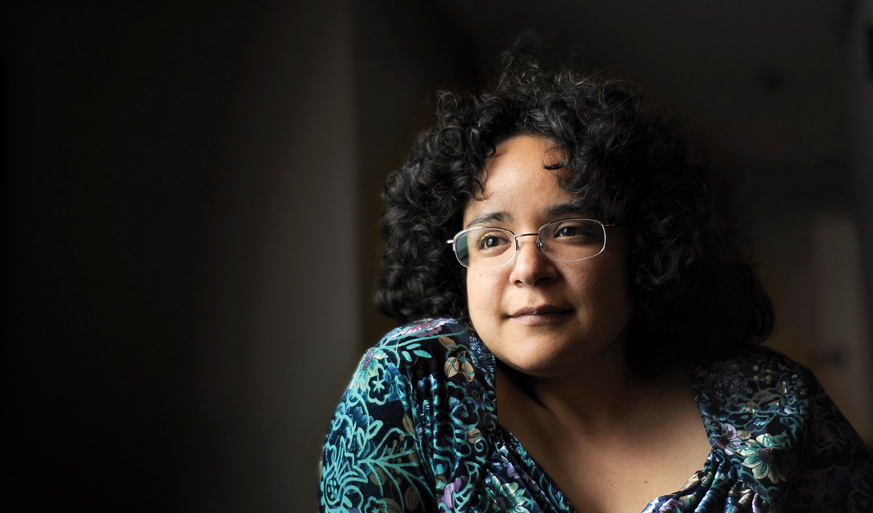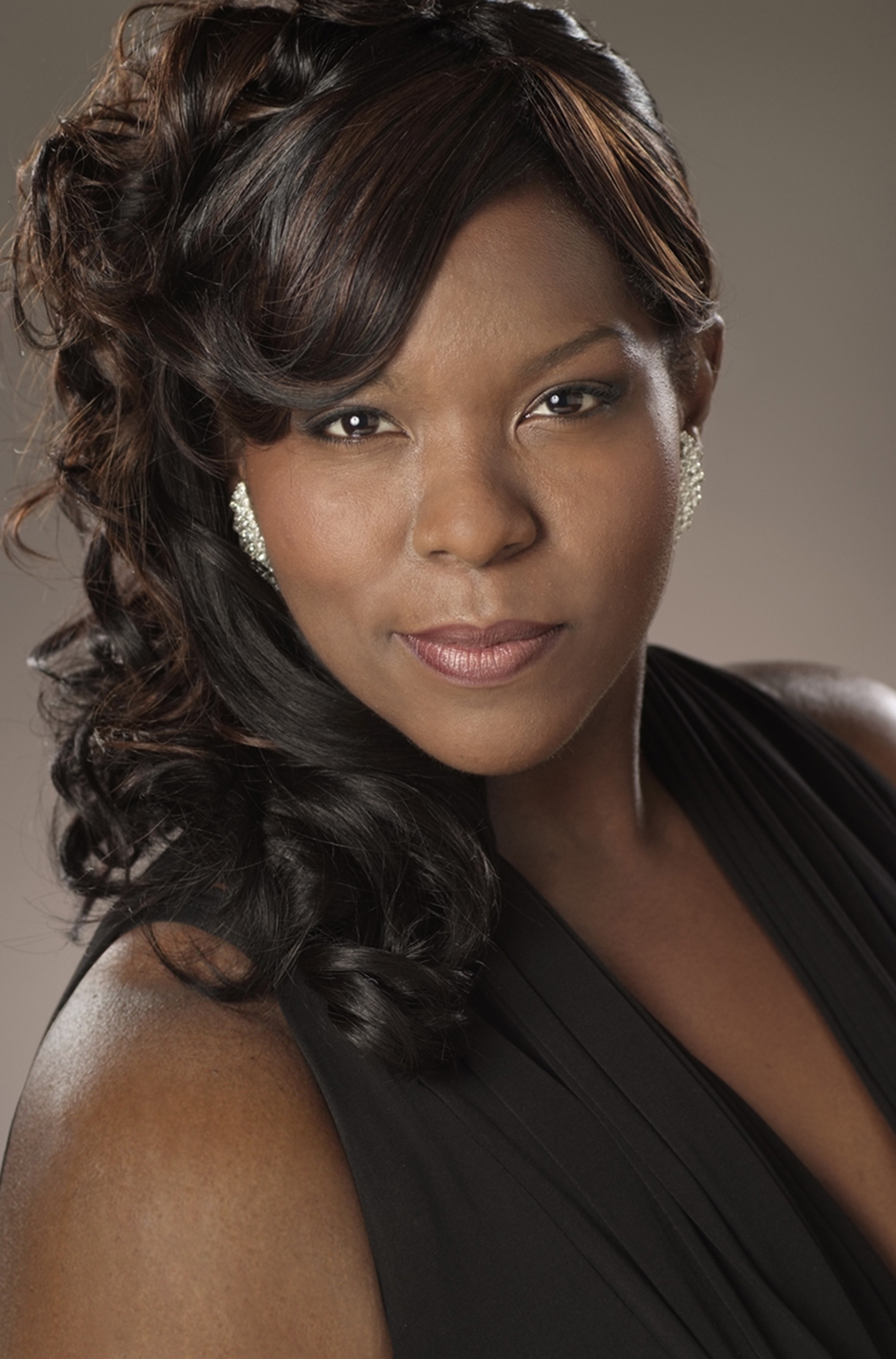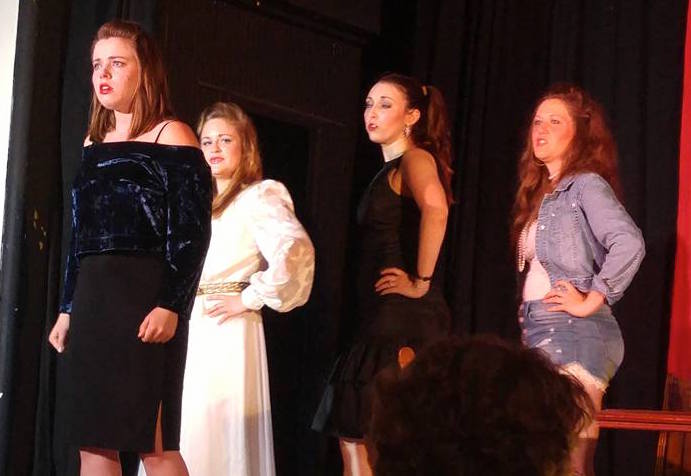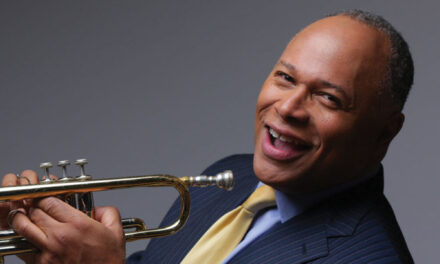Composer Gabriela Lena Frank
Festival of Latin American Music II
Louisville Orchestra
Teddy Abrams, conductor
A review by Annette Skaggs
Entire contents are copyright © 2022 by Annette Skaggs. All rights reserved.
On the heels of a successful “Festival of Latin American Music, Part 1” the previous weekend, Karina Barillas, the Executive Director of the La Casita Center, returned as our host, imparting a welcoming vibe and excitement for the evening’s event.
While we were serenaded with two world premieres the preceding weekend, this concert gave us a wide breadth of the Latin influence to those that aren’t from the Latin nations, such as Aaron Copland and George Gershwin, and those that are.
Gershwin and Copland both enjoyed immersing themselves in the music of whatever country they were fortunate enough to visit. As it happens, Copland was in Mexico at the invitation of a fellow conductor and happened upon a late-night salón that was filled with music and dancing. Taken with the sounds and sights of the evening, Copland composed the oft-performed piece which took its title from the name of that saloon, El Salón México (Salon Mexico). Taking the time to seek out the compositions and sounds of traditional Mexican folk music and imparting these sounds into the score, El Salón México is an instant aural pleasure that radiates the charm of the tunes that it employs. It certainly fit the bill Saturday evening. Our orchestra was right on top of the stanzas where dissonance would be a hindrance, but they tackled it like pros and when you have a gorgeous descant from the trumpet on top, well, that’s just delicious icing.
Borrowing from her classical training, with an affinity towards Benjamin Britten and using his Violin Concerto as part of her composition Concertino Cusqueño (Concert from Cusco), Gabriela Lena Frank channels the Peruvian heritage of her mother to create an inspiring homage to that culture. Infused with lush melodies and a stunning harmonization between the first and second violins, the Concertino concludes with a marvelous interaction with the percussion, violin, and cello that stays with you.
We were gifted with another composer’s work, José Pablo Moncayo, whose piece Cumbres (Summits) certainly has a classical sound, but becomes much larger as it unfolds before us. Commissioned by the Louisville Orchestra in 1953, Moncayo’s score conjures Mexico’s mountaintops and he incorporates the folk music of his time within its score. While the whole of the work leans toward more straightforward writing, there are enough moments of electricity and fire that keep the ears entertained and eager to hear more.
In closing the first half of the evening we hear Arturo Márquez’s Danzón No. 2 (Dance No. 2) which was, according to the program, inspired by friends who happened to be professional ballroom dancers. While we didn’t get to see any ballroom dancing that evening it was hard not to picture two elegantly dressed people sweeping and twirling across the span of the Whitney Hall stage. Teddy Abrams shared that this piece has become a hot composition in part by a recent performance of the danceable tune conducted by Gustavo Dudamel where he amped up the time signature a bit. While Teddy kept the tempo at an easy clip, the composition certainly makes it hard for one to sit still. With influences of mambo, samba, and tango all rolled into the composition and a super-hot piano descant on top of the full orchestra, I can see how this piece is going to be a part of the orchestral repertoire for a very, long time. But it isn’t for the novice instrumentalist. I lost count of how many rhythms, dynamics, and changes in speed there were. It kept us on our toes, figuratively.
As a fan of opera, I was excited to see composer Daniel Catán and his Florencia en et Amazonas (Florence in the Amazon) on the bill. Having the distinction to be the first opera in Spanish to be commissioned by three American opera houses (Los Angeles, Seattle, and Houston), jointly, Florence premiered at the Houston Grand Opera in 1996 to great acclaim. While we didn’t get to see the full opera production, this performance of the orchestration was just as beautiful.
The story, in short, is about a diva, Florence, who is on the search for her lost love Cristobál, a butterfly hunter. As her career and dedication to locate her lover bring her to the Amazon, fate takes hold and magical and fantastical events transpire that change the lovers and those around them, forever.
In the first movement, En el Muelle (On the Pier), there is a definite feeling of river life. Like many of the other Latin pieces that we have heard the past couple of weeks, there is a deep appreciation for the sounds of nature and Catán doesn’t shy away from that importance. In the second and third movements, Arcadio and La Tormenta (The Storm), the composition certainly has a tone of impending doom, nay even a sinister sound to suggest there is danger afoot. Heavier use of the tuba is sometimes a dead giveaway. As the fourth movement, Amanecer (Sunrise) is lighter and brighter (no pun intended), with a return to the nature sounds that are brilliantly made with the harp, piccolo, and flute, the movement turns grand leading to the fifth movement, Paula (a central character in the opera), that with its mournful violin solo turns to the finale, Aria final de Florencia (Florence’s Farewell Song). Within this movement is the culmination of Florence’s life and love, all coming to life within this orchestration.
To close out the evening we are treated to the work of the aforementioned composer George Gershwin and his Cuban Overture.
Back before the Fidel Castro years, Cuba was a go to destination, with lots of food, music, dancing, and fun. Gershwin was able to capture that excitement in his Cuban Overture that sounds like a lot of fun to play as well as listen to. The whole of the orchestra was on deck for this score, including all of the percussionists. There were many chances for instrumental soloists, such as clarinet, oboe and tympani.
This was a perfect selection to close out the evening, leaving all of us in a mood to samba. Another large shout of “WEPA” to everyone involved.
Bravo a Todos!!!
Festival of Latin American Music II
March 12, 2022
Louisville Orchestra
Kentucky Performing Arts
501 West Main Street
Louisville, KY 40202
Louisvilleorchestra.org
Annette Skaggs is heavily involved as an Arts Advocate here in Louisville. She is a freelance professional opera singer who has performed throughout Europe and in St. Louis, Cincinnati, Boulder, Little Rock, Peoria, Chicago, New York and of course Louisville. Aside from her singing career, she has been a production assistant for Kentucky Opera, New York City Opera, and Northwestern University. Her knowledge and expertise have developed over the course of 25+ years’ experience in the classical arts.





